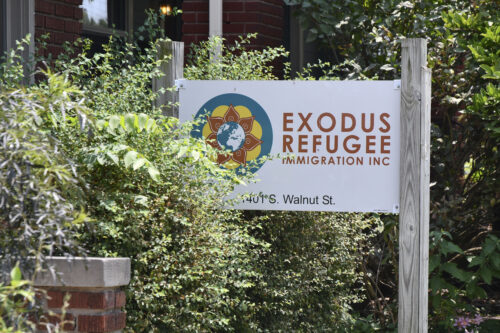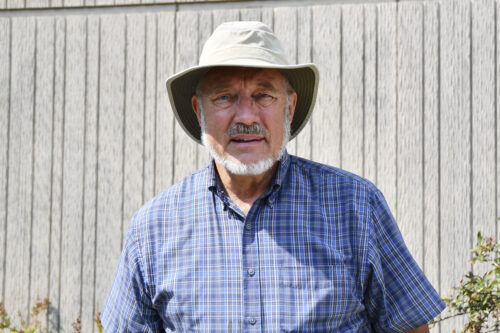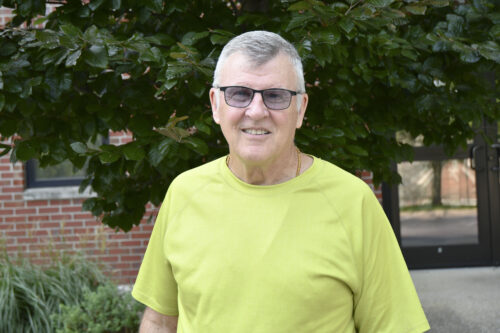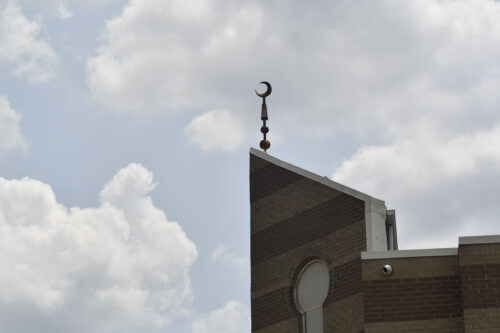By Brookelyn Lambright, Karl Templeton, and Brenna Polovina, Arnolt Center for Investigative Journalism
Editor’s note: To protect the identities of the refugees interviewed, they were not photographed and their names were changed.
Leaving Afghanistan wasn’t a choice. Mike, his wife Sera, and their four children were forced out of their home country after the Taliban took control of the government in 2021. Twenty years earlier, Mike had worked with the U.S. Army to oust the Taliban. Now that the Taliban was back, they wanted Mike and his family dead.
“The Taliban came and took my father,” Mike said. “They took him and asked about me, ‘Where is your son? You should find your son.’ For two or three days, my own father was in jail because of me.”
For the safety of their family, who still live in Afghanistan, Mike and his family have asked to use aliases in this story. Mike said the Taliban is still actively looking for him.
His involvement with the U.S. government and his job as a community leader made him a valuable target for the Taliban.
“When we came here, we didn’t have anything for living because we came with just our clothes,” Mike said.
But Mike knew the only solution to keeping his family safe was to flee. After spending 10 months in Dubai at a refugee camp, they landed in Virginia at another refugee camp, before being transferred to Indianapolis and then Bloomington.
Now, three years later, Mike’s family shares a two-story house. His sister, Elizabeth, her husband and their son live downstairs. Mike and his brother-in-law work the night shift at Cook Medical.
Mike and Sera’s story isn’t unique – it is a reality many refugees face. They flee their home countries because of war, famine, crime, gang violence, corrupt governments, and natural disasters. Many arrive with nothing more than the clothes on their back.
The United Nations Refugee Agency estimates that approximately 117.3 million people are displaced worldwide per year, with around 68,291 refugees resettling to the U.S. during the last fiscal year.
Indiana welcomed 1,266 refugees, with the largest numbers coming from the Democratic Republic of Congo and Burma during the 2023 fiscal year, according to the U.S. Department of State Bureau of Population, Refugees, and Migration. In Bloomington, the largest refugee populations served are Afghani, Congolese, and Syrian.
For people arriving in Bloomington with almost nothing, a patchwork of nonprofits and religious organizations step in to aid with housing, transportation, basic needs and legal services to support new arrivals.
Exodus, a federally funded and State Department implemented program that began in Indiana in 1981 and has served nearly 400 refugees, or about 150 per year in Bloomington, is one of several organizations that provide refugee families with assistance.
“The town has been incredibly welcoming and supportive. Everyone we’ve partnered with works really hard to ensure that their services are tailoring to the needs of refugees, creating welcoming spaces for refugees,” said Erin Aquino, resettlement director for Exodus.

Exodus Refugee Immigration is one of several organizations in Bloomington that provide refugee families with assistance. | Photo by Olivia Bianco
Tight housing market, high costs limit options
One of the biggest hurdles for refugees arriving in Bloomington is finding affordable housing, according to Aquino. Exodus receives $1,325 to house one person for three months, which is not enough money to cover living expenses in Bloomington, she said.
“I always ask people, can you live off of $1,300 for three months? That’s a joke because you could probably not even cover a security deposit with that amount,” Aquino said.
The average rent in Bloomington is $1,206, according to data from the Monroe County Apartment Association.
Exodus spends thousands of dollars in hotel fees for refugees until they are able to find suitable housing in a tight market.
“The hardest, most challenging thing for Bloomington is housing. It is so very hard. This is why graduate workers are striking; they can’t afford to live here,” said Rendy Schrader, senior director for international student and scholar program initiatives in Indiana University’s Office of International Services. “And refugees can’t afford to live here either, so it is a constant challenge to find places that they can afford.”
While Exodus is able to provide incoming refugees with a home and basic furnishings like a couch, bed, and chairs, other organizations like the Islamic Center of Bloomington provide families with other necessary items like vacuums, TVs, and kitchen utensils.
“We try to help where we can with that kind of stuff, especially since our community is a largely student community,” said Anna Maidi, refugee point-person for the Islamic Center. “We have a lot of people saying, ‘I have this to donate or that to donate’ because they’re moving away.”
Mike and Sera point to the TV, the couch, and end tables in their home, all of which were donated to the family.
Mike said he hopes to purchase a home for his family soon. He wants to bring his remaining family in Afghanistan to the U.S. as well. However, Mike and Sera are living on one income. Sera stays home with the children since daycare is so expensive in the U.S., but she said she hopes, when the children get older, that she can return to work.
Limited transportation options make work, life difficult for some
Transportation is important for newly arrived refugees as most don’t have access to their own car. Aquino said Exodus has helped provide transportation to refugees in the past for special events. However, she would like to see refugees better integrated into the community with more reliable and affordable transportation.
“A lot of people are using the bus, but the bus doesn’t run very well on the weekends,” Aquino said. “The bus doesn’t run very well overnight. If you’re wanting to involve people and wanting to employ them and have them come to an event or a class, how are you helping with the transportation barrier?”
Pete Lenzen, the director of the Bloomington Refugee Support Network, helped Mike and Sera’s family with transportation when they arrived in the U.S. Lenzen and volunteers at the network provided them with rides to medical appointments, the grocery store, and other errands around town.

Pete Lenzen, the director of the Bloomington Refugee Support Network. | Photo by Olivia Bianco
The Refugee Support Network has helped around 50 families in the past six years. After a family’s financial assistance with Exodus ends, the network helps with any transportation or financial needs.
To Mike and Sera’s kids, Mr. Pete, as he is affectionately called, is more than a volunteer.
“My kids say Mr. Pete is their grandpa. All our family says Mr. Pete is our angel,” Sera said.
The Islamic Center has also struggled to establish a reliable transportation system for refugees. Until refugees have access to a car, making it to events and services at the mosque is difficult.
“Unfortunately, we can’t arrange rides for every event,” Maidi said. “The best thing for them would be for them to come to the events and meet everybody and feel like a part of the community. Not only for their emotional health, but also for their English.”

Brad Pontius, community and global engagement pastor at Sherwood Oaks Christian Church. | Photo by Olivia Bianco
When refugees first arrive, they often take jobs “no one else wants,” said Brad Pontius, community and global engagement pastor at Sherwood Oaks Christian Church. That means they end up working strange hours that require them to be there early in the morning or very late at night when the bus doesn’t run.
“Although we do have public transportation here, as in a bus system, it is not adequate for people who live in apartments that can’t get to a bus easily or quickly,” Pontius said.
Language barriers leave some refugees isolated
Language plays an important role in obtaining a job once refugees arrive. Those who have better English language skills are more likely to land a job quickly.
“[English] is even more critical because adult learners are the ones who need to get jobs, and in fact, there aren’t many places where they can learn,” Pontius said.
Bloomington immigration lawyer Christie Popp said language difficulties can make it harder to understand official communications about the immigration process and government assistance.
“Language barriers are always an issue,” Popp said. “That is quite an obstacle.”
Although many government documents are in English and Spanish, that doesn’t help those who speak other languages, Popp said, including immigrants from Central and South America whose first language is indigenous.
“They may have grown up speaking a different language, and that can be very difficult to access benefits,” Popp said.
In Bloomington, Broadview Learning Center offers adult education programs, including high school equivalency diploma classes, English language learning classes (ESL), and career training.
“I think, by improving your English, it allows someone to engage with their community in a way they weren’t able to previously,” said Lily Albright, the director of adult education for the Monroe County Community School Corporation. “It opens up their own life but also allows people around them to connect with them in a way they weren’t able to before.”
ESL classes follow a similar schedule to that of MCCSC schools. Last school year, 400 students, who represented 58 countries and spoke 30 different languages, took ESL classes.
“Some are here to study, some are here with their family who came to study at IU, some are seeking job opportunities, some are refugees. There’s a whole variety of learners that walk through our doors,” Albright said.
Refugee organizations agree that language access is essential to integrating families into the community.
Language access plays a big role in how quickly refugees adjust to living in the U.S. Refugees from Latin America tend to adjust more quickly because more Spanish-language resources are more readily available, Aquino said.
But stay-at-home moms tend to struggle more than their husbands when it comes to learning English.
“I do especially worry about the moms,” Maidi said. “In the beginning, when they don’t have a car, they can’t really go anywhere. I think for the men, it’s a little bit different because they’re out looking for a job, and they may be able to go to the mosque a little more easily and create some of those social connections.”

The Islamic Center of Bloomington provides a variety of help to refugees, such as household goods, transportation, and a WhatsApp group to help people get connected to the community. | Photo by Olivia Bianco
To combat that isolation, Maidi said the Islamic Center started a WhatsApp messaging group for refugee mothers, where they can share photos, recipes, or just check in on one another.
Sera and Elizabeth, both stay-at-home moms, agree their English could be better. However, they can’t leave their children alone to attend language classes, so improving their English has been difficult.
Broadview has identified a need in the community for increased access to language courses, specifically for those just beginning English. Starting next year, it will offer additional classes with more times, as well as sessions in person and online.
“I think it’s really rewarding to know that when someone leaves our program, they’re entering our community with a new set of skills that are immediately, positively impactful to not only their own life, but also their coworkers, neighbors, everyone who lives here,” Albright said.
Public perceptions, legal process complicates resettlement
Aside from settling into their new homes, refugees face other hurdles navigating the legal immigration process as well as sometimes negative perceptions about their presence.
The Neighborhood Christian Legal Clinic in Indianapolis offers legal assistance and advice on housing, taxes, and financial management to refugees throughout the state. In addition to direct client services, the clinic participates in outreach to immigrants and also to educate community members through workshops on topics such as immigrant rights and eligibility for benefits, said Angelin Fisher, director of immigrant services for the clinic.
Fisher said there’s often misunderstanding about the difference between refugees and other immigrants, as well as misconceptions about the immigration process. There’s a narrative that says it’s easy for people to get asylum or be granted an immigrant visa, but those processes are lengthy and complex, she said.
Refugees must have met criteria that prove they are in danger of persecution because of their race, religion, political affiliation, or membership in a certain social group. The refugee process is governed by the Office of Refugee Resettlement under the Department of Health and Human Services, while asylum and other immigration matters are handled by U.S. Citizenship and Immigration Services in the Department of Homeland Security.
“That’s a very difficult process. Very few people can qualify for that,” Fisher said of refugee status.
Refugees and other immigrants also often face misconceptions about benefits they might be entitled to. While refugees do receive government assistance to help them settle and integrate into life in the United States, many other immigrants have no entitlement to health care or other benefits.
Fisher said the climate in Indiana toward immigration has become more challenging in recent years. She cited the example of laws in the state that make it difficult for some immigrants to obtain a driver’s license. In 2023, legislators passed HEA 1050, which said humanitarian parolees, who are temporarily admitted because of emergency conditions in their home countries, were ineligible for a driver’s license, unless they came from Ukraine. After legal challenges from parolees from Haiti, the legislature this year repealed the law and made it impossible for any humanitarian parolee to obtain a license.
“There’s many things that I love about being a Hoosier, and one of them is that I think we have historically had a really friendly, welcoming, warm spirit,” said Fisher, whose parents immigrated to the U.S. “But I think that the trajectory that we are on where the topic of immigration, and then specifically immigrants themselves, has become so vilified, it really saddens me, because I don’t feel like it’s in keeping with who we really are as Hoosiers and as a state.”
Refugees remain optimistic with community support
Mike and his family fled Afghanistan because of dangerous conditions brought on by the Taliban. But they and others like them have remained resilient.
Fisher calls refugees “some of the most gracious, resilient, courageous people that I have met, even though they face some of the most unimaginable hardships — the death of family members, torture, you know, all kinds of assault. Not to mention just leaving everything behind that they’ve ever known,” she said. “They continue to be kind and so thankful. And I’m just really blessed that I get to do this work.”
Maidi said she sees a lot of positivity and optimism among refugees.
“In general, I think that kind of goes hand in hand with being a refugee in some ways because you’ve got to look on the bright side. You’ve been through too much to, otherwise you’re just going to be in despair,” Maidi said.
When asked what they miss most about home, Mike and Sera say they miss everything – their home, their family and friends, their culture, and their language. Mike still talks to his family, when he can, but it’s not the same as seeing them in-person.
But Mike and Sera say living in the U.S. provides their children with opportunities they would never otherwise have.
“Good things are here for my kids,” Sera said. “In Afghanistan, girls are not allowed to go to school after the sixth grade.”
Mike’s sister, a school teacher, and Sera’s sisters, both journalists, are no longer able to work. Living in the U.S. means the couple’s oldest daughters have an opportunity to attend college.
“In the future, my kids will go to Indiana University. I think there’s a lot of benefits [to] living here in Bloomington,” Mike said. “Here is a safe city. There’s no fighting. [It’s] a small city, small town, student city, and not expensive. Everything is good.”
Mike and Sera are focused on working hard to create a better future for their children. Their son hopes to become a pilot one day, while their daughter, Catherine, looks forward to entering middle school.
“Day by day by day,” Mike said. “We work to make our life.”
Lily Marks, Marissa Meador, Ryan Murphy, Haley Ryan and Lizzie Wright contributed reporting. This story was written by journalists at the Arnolt Center for Investigative Journalism at Indiana University in partnership with the Limestone Post.


